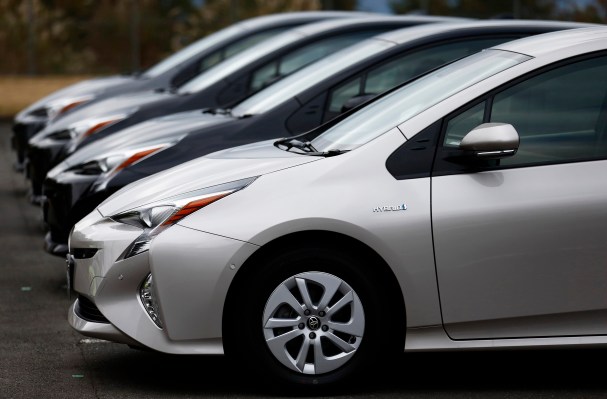Toyota has been taking a beating in the press these days. The new Prius, arguably the company’s standard bearer, has been damned with faint praise. One review called it “the best CD player in a download world.”
Beyond that, the company has been called out for lobbying against California’s right to set emissions standards and more generally to slow the transition to electric vehicles. That’s probably because its EV strategy is in shambles.
The automaker, once viewed as a leader in low-emissions motoring, has fallen from its perch.
Now, that may not matter much in the short term. The company is still profitable, netting $3.79 billion in the third quarter.
But the danger to the company lies in its long-term prospects. Investors have pressed the company on its EV plans, which are anemic enough to endanger its status as one of the world’s largest automakers. Those concerns are undoubtedly reflected in its stock price, which today hovers just a few dollars above where it traded 16 years ago when it was riding the Prius wave.
It’s possible that Toyota can pull a rabbit out of the hat and roll out a killer set of EVs. Or maybe the company is right about hydrogen, and it’ll achieve a breakthrough in fuel cell technology while simultaneously building an extensive network of green hydrogen stations. Maybe.
Toyota’s problems are not technical — the 25-year-old Prius brand is proof that the automaker has some rather impressive engineers. Instead, the company seems to have misjudged consumer and regulator sentiment. Perhaps more important, it has lost control of the narrative. In the automotive industry, that matters more than you might think.
Of all companies, Toyota should know the importance of storytelling. The Prius wasn’t just a technological feat — it was a marketing coup. After the first generation sold slowly, sales skyrocketed when the now-iconic 2003 redesign was introduced. A star-studded cast lined up to buy them, including Cameron Diaz, Tom Hanks, Madonna and Leonardo DiCaprio. Suddenly, Toyota wasn’t just a brand you bought because it could reliably get you from point A to point B; buying one became a statement.
The Prius had some tangible benefits, too, in addition to posting spectacular sales numbers. It helped nudge Toyota’s fleetwide, real-world fuel economy from 21.65 mpg in 2003 to 28 mpg today. It helped refine the company’s hybrid technology, which is now deployed throughout its fleet.
And yet Toyota’s real-world fuel efficiency has merely kept pace with its competitors. Hybrids alone haven’t been enough to help it break away from the pack.
Meanwhile, Toyota’s competitors are sensing an opportunity. Some 580 miles west of Toyota City, Hyundai appears to have been studying the Prius playbook. The Korean company is in many ways similar to Toyota. Both are parts of conglomerates (of sorts), both have extensive hybrid offerings and both have invested heavily in hydrogen. Yet Hyundai has done a better job of reading the room. Instead of arguing against EVs, it has embraced them, using them to cast a green halo over the entire brand.
In many ways, Hyundai’s journey into EVs mirrors Toyota’s experience with the Prius. It tested the waters with an early, limited production model called the BlueOn, then years later dove deeper with the compact Ioniq hatchback (which bore a striking resemblance to the Prius).
But Hyundai’s true breakout moment occurred two years ago when it introduced the Ioniq 5, a crossover-hatchback thing that was strikingly styled and immediately recognizable; just like the 2003 Prius. Reviewers have praised its versatility, charging speed, handling and, most importantly, design. Details from that model, like pixelated taillights, are now trickling through the lineup, suggesting that the company understands that there’s value in connecting its other models to its well-received Ioniq EV sub-brand.
The Korean automaker’s move into EVs may end up helping its fuel efficiency figures, just like the Prius did for Toyota, though it’s still too early to tell. Hyundai’s new SUVs probably aren’t helping matters. Still, the company was the most efficient in 2022, according to the U.S. Environmental Protection Agency, though only by a hair, barely beating corporate cousin Kia and not far ahead of Honda, Nissan, Subaru, and, yes, Toyota.
Those recent real-world results for the two automakers aren’t that far apart, and yet the narrative surrounding them is entirely different. Much like the stock market, the automotive world is all about future expectations. Toyota’s sales pitch has been heavily reliant on yesterday’s technology, whereas Hyundai is touting its fully electric future. For investors and consumers alike, the story matters.
